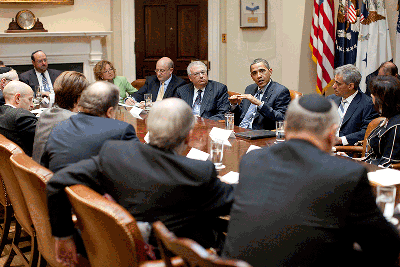Government Relations

APN maintains strong relationships with Members of Congress, congressional staff, and Executive Branch officials. A non-partisan organization . with a non-partisan mission, APN supplies timely information, analysis, expertise and education, providing a pro-Israel, pro-peace, American Jewish perspective on issues and legislation related to Israel and the quest for Middle East peace and, security. APN also engages in advocacy, directly and through its nationwide Action Network, to promote pro-Israel/pro-peace legislation and policy
APN publishes the Legislative Round-Up -- the most comprehensive resource available anywhere on Middle East-related developments on Capitol Hill -- every Friday when Congress is in session. APN also hosts policy briefings on Capitol Hill and brings experts to meet with policy makers to maintain a steady flow of balanced information from the region.
1. Bills, Resolutions & Letters
2. APN Analysis/Commentary on Obama Signing Statement
3. Hearings
4. On the Record
Note: The campaign to legitimize Israeli settlements – through U.S. legislation conflating settlements and Israel – continues. In tandem with this campaign is a steady stream of reports about U.S. policy vis-à-vis settlements and the West Bank since 1967. Many of these reports – either out of incompetence or a deliberate effort to mislead – misrepresent the facts (to say the least). In response to the latest round of factually incorrect reports, on 2/16 APN published: Setting the Record Straight (again) on U.S. Labeling Policy – which includes both analysis and links to all the relevant U.S. government original source documents.
On February 24th, Congress sent HR 644, known as the “Customs Bill,” to President Obama's desk. As we has been reporting for the past year, this bill includes a provision that, while ostensibly about countering the boycott, divestment, and sanctions movement (BDS) against Israel, is in truth about legitimizing settlements and for the first time in history legislating U.S. support for and defense of Israel's settlement enterprise and the occupation that enables it. The provision achieves this by conflating Israel and the occupied territories, in effect requiring the U.S. to treat both as sovereign Israel.
As long predicted by APN, when President Obama signed HR 644 into law shortly after it reached his desk, he issued a signing statement observing (correctly) that the conflation of Israel and settlements contradicts longstanding U.S. foreign policy and violates the Executive's constitutional foreign policy prerogative, and declaring that this conflation would not be implemented.
1. Bills, Resolutions & Letters
2. Hearings
3. On the Record
Note: This week, APN issued an Action Alert opposing legislation in both the House and Senate that seeks to legitimize settlements by conflating settlements with Israel. That action alert, “Tell Congress: Pro-Settlements is NOT Pro-Israel,” is here.
(published 2/1/16 at LobeLog)
Attention is finally focusing on a bill pending in Congress that would make it U.S. policy to defend and support Israeli settlements. Known as the Customs Bill, this legislation regulates U.S. trade relations with foreign countries and includes the pro-settlement language in a provision that, ostensibly, is about defending the state of Israel against boycotts. It is part of a broader campaign, waged in Washington and in state capitals across the country, that seeks to undermine growing grassroots support for the boycotts, divestment, and sanctions (BDS) against Israel and reverse Washington’s longstanding opposition to settlements in the occupied territories.
Back in July, Congress passed a similar provision as part of the Trade Promotion Authority (TPA) bill. The State Department responded with a statement rejecting the pro-settlements language, noting that “[e]very U.S. administration since 1967—Democrat and Republican alike—has opposed Israeli settlement activity beyond the 1967 lines.” The administration’s rejection provoked a harsh critique by one Washington Post blogger who writes on both legal issues and the Israeli-Palestinian conflict.
The blogger, Eugene Kontorovich, testified on the BDS movement and ways to combat it before the Subcommittee on National Security of the House Committee on Oversight and Government Reform last July. Now, with the Customs Bill in the spotlight and likely to soon come before President Obama, the arguments presented in his critique—which apply equally to the settlements-related provision in the Customs Bill—bear close scrutiny.
In 2014, opponents of boycotts, divestment, and sanctions (BDS) against Israel began promoting legislation in various U.S. states denouncing the BDS movement.
In 2015, these efforts shifted/expanded to mirror efforts in the U.S. Congress to hijack concerns about BDS against Israel in order to pass legislation mandating that Israeli settlements be treated, in effect, as part of sovereign Israel.
At the outset of 2016, it is already clear that these efforts are continuing and building. Indeed, the clear trend at the state-level is moving away from anti-BDS resolutions in favor of binding legislation to – in effect – have states boycott, divest from, and sanction companies that engage in BDS against Israel, or that in any concrete way differentiate between Israel and the settlements.
This table --
which will be updated regularly and which is based on data drawn from the websites of the various state
legislatures -- is intended to help people understand and follow what is happening at the state
level.
(Do you know about legislation missing from the table? Please let me know - LFriedman@peacenow.org).
1. Omnibus: DOD Appropriations
2. Omnibus: ForOps Approps
3. Omnibus: Other stuff
NOTE: FOR INFORMATION ON ALL OTHER LEGISLATION, HEARINGS, ETC, SEE PART 1 OF THIS WEEK’S ROUND-UP